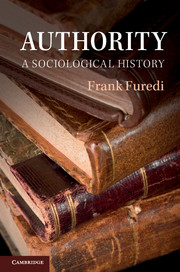Book contents
- Frontmatter
- Contents
- Preface
- Introduction: always in question
- 1 Thersites and the personification of anti-authority
- 2 Socrates and the quest for authority
- 3 Rome and the founding of authority
- 4 Augustus: a role model for authority through the ages
- 5 Medieval authority and the Investiture Contest
- 6 Medieval claim-making and the sociology of tradition
- 7 Reformation and the emergence of the problem of order
- 8 Hobbes and the problem of order
- 9 The rationalisation of authority
- 10 The limits of the authority of the rational
- 11 Taming public opinion and the quest for authority
- 12 Nineteenth-century authority on the defensive
- 13 Authority transformed into sociology's cause
- 14 The rise of negative theories of authority
- 15 By passing authority through the rationalisation of persuasion
- 16 In the shadow of authoritarianism
- Conclusion: final thoughts
- Bibliography
- Index
13 - Authority transformed into sociology's cause
Published online by Cambridge University Press: 05 June 2014
- Frontmatter
- Contents
- Preface
- Introduction: always in question
- 1 Thersites and the personification of anti-authority
- 2 Socrates and the quest for authority
- 3 Rome and the founding of authority
- 4 Augustus: a role model for authority through the ages
- 5 Medieval authority and the Investiture Contest
- 6 Medieval claim-making and the sociology of tradition
- 7 Reformation and the emergence of the problem of order
- 8 Hobbes and the problem of order
- 9 The rationalisation of authority
- 10 The limits of the authority of the rational
- 11 Taming public opinion and the quest for authority
- 12 Nineteenth-century authority on the defensive
- 13 Authority transformed into sociology's cause
- 14 The rise of negative theories of authority
- 15 By passing authority through the rationalisation of persuasion
- 16 In the shadow of authoritarianism
- Conclusion: final thoughts
- Bibliography
- Index
Summary
Sociology emerged at a time of moral hiatus. It was dominated by the consciousness of transition from the certain traditions of the past to uncertain beliefs that were not yet formed. Emile Durkheim was intensely conscious of transition, and a keen interest in the shift in moral sensibility pervaded his work. He wrote of a world where ‘the old gods are growing old or are already dead, and others are not yet born’, and criticised Comte for his vain attempt ‘artificially’ to revive the ‘old historic souvenirs’, because ‘it is life itself, and not the dead past’ that ‘can produce a living cult’. As if to try to reassure himself, Durkheim wrote that,
this state of incertitude and confused agitation cannot last forever. A day will come when our societies will know again those hours of creative effervescence, in the course of which new ideas arise and new formulae found which serve for a while as a guide to humanity.
Outside of Europe Franklin Henry Giddings, one of the founders of American sociology, remarked that though ‘the speculative theories of causation embodied in religious systems have fallen into discredit’, nevertheless ‘the convictions of human need, of the supremely desirable ends of life, of what ought to be, that religious systems have fostered and transmitted have been and in the main are still vitally true’.
The recognition of the need for belief expressed a consciousness of authority lost. This sensibility was more than a reaction to apprehensions about the threat of disorder from below; it touched on existential questions to do with meaning and moral guidance. But recognition of such an absence only highlighted the elusive character of the problem. ‘To endow a government with the authority it requires, it is not enough to feel the need for this’, warned Durkheim: ‘we must address ourselves to the sole sources from which all authority is derived: the establishment of traditions, a common spirit, etc’. For Durkheim, science and rationalised forms of authority could help give guidance but not provide the normative foundation for a ‘common spirit’.
- Type
- Chapter
- Information
- AuthorityA Sociological History, pp. 299 - 327Publisher: Cambridge University PressPrint publication year: 2013



